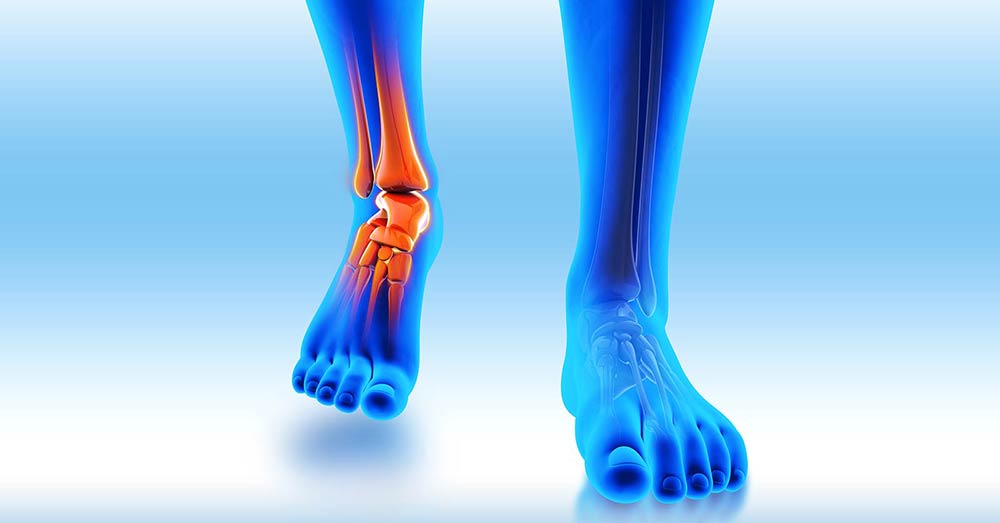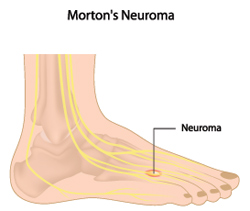Contact us today for a consultation with one of our physicians.


Morton's neuroma, also known as Morton's metatarsalgia neuroma or intermetatarsal neuroma, is a painful nerve condition that most often occurs between the third and fourth toes, but sometimes the second and third toes are affected. A nerve in the foot becomes irritated and thickened, which can cause severe pain. This compression creates enlargement of the nerve, eventually leading to permanent nerve damage. The condition can occur in one foot or both feet.
Morton's neuroma occurs when the nerves between the toe bones becomes irritated, which causes it to become thicker. The exact cause is unknown, but it may be caused by the nerve being compressed, stretched or damaged. Morton's neuroma can occur at any age, but most often affects middle-aged women. The condition has been linked to:
Symptoms of Morton’s neuroma include tingling, burning, numbness, pain, and a feeling that something is inside the ball of the foot. You may initially experience a tingling sensation in between your toes, which progressively gets worse over time as the Neuroma enlarges. This eventually develops into a sharp shooting or burning pain in the ball of your foot or at the base of your toes. There may also be some numbness in your toes. Some describe walking with Morton's neuroma as feeling like there's a small stone stuck under your foot. Removing your shoes and rubbing your foot may reduce the pain.
It's a good idea to make an appointment to see one of the physicians at Soma Orthopedics if you have persistent symptoms of Morton's neuroma, as the condition is unlikely to improve on its own. Our well trained physician will examine your foot and ask questions to find out about the pain, your symptoms, what type of shoes you usually wear, about your work, lifestyle and sporting activities.
Our physician could suggest simple measures you can try at home to reduce your symptoms, or recommend other treatments. Treatment for Morton's neuroma will depend on how long you have had the condition and its severity. Treatments include non-surgical and surgical. Some non-surgical treatments include:
Should these treatments fail, surgery could be advised. Surgery could involve removing part of the nerve or other procedures. Simple non-surgical treatments are effective for some people. Others may need surgery.
Surgery for Morton's neuroma is usually recommended if you have very severe pain or if the non-surgical treatments haven't worked. During the operation, a small incision is made on the top or bottom of your foot to access the affected nerve. They will then either increase the space around the nerve by removing some of the surrounding tissue, or remove part of the nerve; if this is done, the area between your toes will be permanently numb.
The procedure is usually carried out using a general anesthetic or local anesthetic. This procedure is done as an outpatient procedure; there is no need to stay in the hospital overnight. After the procedure, you'll need to wear a special protective shoe until the affected area has healed enough to wear normal footwear. You can usually walk soon after the operation, although it will take weeks or months to make a full recovery. Most people who have surgery to treat Morton's neuroma have positive results and their pain is relieved afterwards. As with all types of surgery, however, complications can occur, such as swelling, infection and pain. You should discuss the risks with your surgeon before having the procedure.
For more information about the foot nerve condition Morton's neuroma, and how it can be treated in the Los Angeles and Beverly Hills, CA area, please contact us at 855-SOMA-844 (855-766-2844).